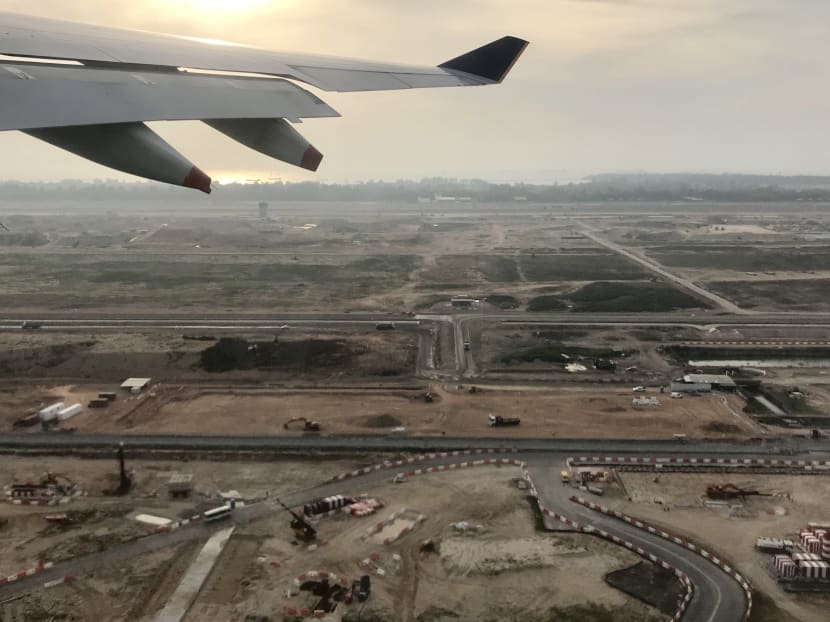Laws passed to pave way for airport development levy, fines against tardy airlines
SINGAPORE — Amendments to the aviation laws were passed in Parliament on Monday (March 19), paving the way for the new levy — announced last month — to be introduced to fund airport developments including Terminal 5 and related infrastructure in Changi East.

Amendments to the aviation laws were passed in Parliament on Monday (March 19), paving the way for the new levy — announced last month — to be introduced to fund airport developments including Terminal 5 and related infrastructure in Changi East. Photo: Mugilan Rajasegeran/TODAY
SINGAPORE — Amendments to the aviation laws were passed in Parliament on Monday (March 19), paving the way for the new levy — announced last month — to be introduced to fund airport developments including Terminal 5 and related infrastructure in Changi East.
Among other things, the new laws also allow Changi Airport to fine tardy airlines which misuse their slot timings by arriving earlier or later than scheduled.
From July 1, passengers flying out from Changi Airport will have to pay S$47.30 — or S$13.30 more — in departure charges, which includes a new Airport Development Levy (ADL).
The levy is chargeable at S$10.80 for departing passengers and S$3 for transit passengers.
Two Members of Parliament (MPs) spoke during the debate on Monday, with Workers’ Party Non-Constituency MP Dennis Tan questioning the rationale for charging different amounts for departing and transit passengers.
In response, Second Transport Minister Ng Chee Meng said this was simply because “transfer passengers do not use the full extent of airport facilities”. He added that this was a “fair approach”.
At the same time, Changi Airport Group (CAG) will be increasing aeronautical charges for both passengers and airlines over the next six years, to fund the expansion and upgrading projects. The increase in fees – not applicable to transit passengers – will kick in at S$2.50 from July 1, and will go up by S$2.50 every year from April 1 next year to April 1, 2024, for all passengers who start their departures from Changi Airport.
Airlines, on the other hand, will see their landing, parking and aerobridge (LPA) fees go up by 1 per cent every year for six years.
Chua Chu Kang GRC MP Zaqy Mohamad was concerned that the new measures could affect the competitiveness of Changi Airport. “We do not want the airlines to feel that it is disadvantageous for them to operate from here,” he said.
Mr Ng said the ADL rates were revised downwards from initial figures, after taking into account feedback from industry stakeholders such as airlines.
“The ADL rates (were also set) at a level that is competitive against other hubs and airports which have implemented similar charges for airport expansion. We also took into account our strategies for air hub competitiveness,” added Mr Ng.
In 2016, the Hong Kong International Airport, which is building a third runway due to be completed in 2024, started collecting a levy of between HK$70 and HK$180 (S$12 and S$30) per traveller.
Mr Zaqy also asked how the Government plans to help airlines cushion the impact.
In response, Mr Ng said the Government would put in place “short term measures” to assist airlines. Details are being worked out.
The Civil Aviation Authority of Singapore (CAAS) Act was also amended to include provisions against tardy airlines which misuse their slot timings.
In order to optimise the use of airport capacity, slot coordinators will now be able to impose regulatory sanctions and a maximum fine of up to S$100,000 against airlines which arrive before or after their slot timings.
Mr Ng said: “Every 90 seconds, one flight takes off or lands. Slot misuse, such as intentional non-adherence or hogging of slots by airlines, impose costs on the airport, airport employees, other airlines and passengers.”
Mr Zaqy, who spoke largely in support of the Bill, asked for further clarification as to how the move will allow more efficient use of the airport.
Mr Ng replied that it will have “a strong deterrent effect” against repeated and deliberate misuse by airlines. “The maximum (fine) quantum of S100,000 will wipe out any profits from abusing any slots to operate a flight,” he said.






